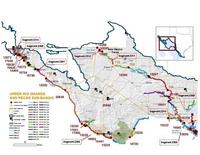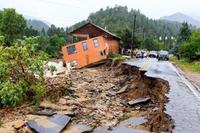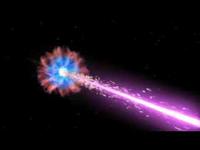-
DHS announces expansion of cyber student volunteer initiative
DHS the other day announced the launch of the 2014 Secretary’s Honors Program (SHP) Cyber Student Volunteer Initiative for college students. Through the program, more than 100 unpaid student volunteer assignments will be available to support DHS’ cyber mission at local DHS field offices in over sixty locations across the country.
-
-
Guards at U.K. nuclear weapons facility slept on the job, skipped routine patrols
Police officers of the U.K. Ministry of Defense police, assigned to guard Britain’s nuclear weapons, are under investigation after it has been reported that they had slept on the job and failed to complete routine patrols at a nuclear weapons facility. The Atomic Weapons Establishment (AWE) in Burghfield, Berkshire, is the location of the complex final assembly of nuclear weapons, and also where the U.K. nuclear warheads are maintained and decommissioned.
-
-
Upper Rio Grande to experience growing gap between water supply and demand

Increasing temperatures and changes in the timing of snowmelt runoff could impact the amount of water available on the upper Rio Grande in the future, says a news study. Temperatures will increase four to six degrees Fahrenheit by the end of the twenty-first century, according to the climate modeling used in the study. Although the modeling projects that total annual average precipitation in the basin will not change considerably, we are likely to see a decreasing snowpack, an earlier and smaller spring snowmelt runoff and an increase in the frequency, intensity and duration of both droughts and floods.
-
-
U.S. loses clean electricity as nuclear power plants keep closing
Four nuclear power plants, sources of low-emissions electricity, have announced closings this year. The main reason: the increasing availability of cheap natural gas as a result of fracking. If plants continue to shut down instead of extending operations, the United States risks losing 60 percent of its clean electricity starting in 2030, according to a new report by the American Physical Society (APS). The APS calls on socially responsible investors to encourage utilities to consider carbon emissions in business decisions.
-
-
Post-Sandy study shows a polluted but largely intact barrier system off Long Island
As coastal communities continue to rebuild in the wake of Hurricane Sandy, scientists last week reported some encouraging news: The storm did not seriously damage the offshore barrier system that controls erosion on Long Island. Long-term concerns remain about the effects on the region of sea-level rise, pollutants churned up by the storm within back-barrier estuaries, and the damage closer to shore, but in the near-term, Long Island residents can rebuild knowing that Hurricane Sandy did not significantly alter the offshore barrier systems that control coastal erosion on the island.
-
-
Scrapping sea level protection puts Australian homes at risk
As the science on the coastal impacts of climate change gets stronger, the protections for Australia’s coastal communities are getting weaker. Along the eastern seaboard of Australia, where most Australians live, state governments are relaxing their policies and largely leaving it to local councils to decide if homes can be built in low-lying areas.Over the past fifty years, there have been twenty-five national inquiries and reports into coastal management. Those inquiries have overwhelmingly come to the conclusion that rather than leaving it to local councils, Australia needs one set of clear, national guidelines on coastal development and infrastructure. That is the opposite of what we are now seeing around Australia, with a mish-mash of different rules in different states. If that continues, everyone will pay.
-
-
Global map predicts giant earthquakes
Researchers have developed a new global map of subduction zones, illustrating which ones are predicted to be capable of generating giant earthquakes and which ones are not. The research comes nine years after the giant earthquake and tsunami in Sumatra in December 2004, which devastated the region and many other areas surrounding the Indian Ocean, and killed more than 200,000 people.
-
-
Cybersecurity isn’t all about doom and gloom
Much is made in the press of the devastating effects that weak cybersecurity is having on the economy in the United Kingdom and globally. The threat is compounded by a significant skills shortage. The U.K. government thinks the problem is so severe that it has identified cybersecurity as a Tier 1 national security threat and invested 860 million pounds to defend the country’s digital shores. What all this means is that there is money to be made from cybersecurity and small businesses should not fear it but embrace it. The business opportunities are boundless in cybersecurity. One area that is promising in this sense is the move towards smart cities. As the infrastructure around us, such as traffic lights and utilities becomes more regularly controlled via computers, market opportunities emerge
-
-
Zapping bridges with electricity to test for corrosion
One out of nine of the nation’s bridges is structurally deficient and that more than 30 percent of bridges have exceeded their 50-year design life; the average age of the nation’s bridges is currently forty-two years. Motorists in the United States make more than 200 million trips across bridges rated structurally deficient or in need of significant maintenance and yearly inspection. Of the more than 17,000 bridges in New York, 12.5 percent are structurally deficient and 27 percent are considered functionally obsolete. One major culprit for bridges’ deterioration: corrosion of reinforcing steel. New testing method could replace expensive, time-consuming visual inspections.
-
-
New Jersey shore to face unprecedented flooding by mid-century
Geoscientists estimate that the New Jersey shore will likely experience a sea-level rise of about 1.5 feet by 2050 and of about 3.5 feet by 2100 — 11 to 15 inches higher than the average for sea-level rise globally over the century. That would mean, the scientists say, that by the middle of the century, the one-in-ten year flood level at Atlantic City would exceed any flood known there from the observational record, including Superstorm Sandy.
-
-
Colorado faces costly, lengthy challenge fixing flood-damaged roads

The Colorado Department of Transportation(CDOT) has met the 1 December 2013 deadline to reopen twenty-seven flood-battered highways in the state, but the department still faces major challenges in making permanent fixes to damage caused by September’s historic floods. The scope of the task is currently being evaluated as highway managers explore technological and engineering changes needed to keep about 485 miles of damaged roadway more resistant to mass flooding.
-
-
No need to worry about getting fried by gamma ray burst

If recent news that University of Alabama in Huntsville (UAH) researchers observed the largest gamma ray burst ever has you nervous about getting blasted into extinction by a massive burst from space, the UAH researchers have good news. The chances of Earth being fried by a burst are exceedingly rare.
-
-
New Silicon Valley focus on cybersecurity
The last time Silicon Valley focused on cybersecurity was in the 1990s. That focus saw the emergence of two giants: McAfee and Symantec. The two companies remain the most recognizable household names, thanks to their traditional firewall and anti-virus products. Now they find the arena which they thought was their own encroached from two sides. On one side there are tech giants like Hewlett-Packard and Cisco Systems, which see new revenue opportunity in cybersecurity. On the other side there is a rush of start-ups backed by large investments of venture capital.
-
-
Cyberweapons to defend electricity's perimeter
Cyber war, cyber terror, and cyber crime target all manner of operations and, by design, cannot be detected until they have already done their damage. Nobody is immune to such attacks, and particularly target-rich environments include government bodies and critical power industries such as bulk electricity supply (BES). Hackers and cyberdefenders clash just outside of, at, or inside an organization’s electronic security perimeter (ESP). To counter such threats, a bulk electricity solution — North American Electric Reliability Corp.’s (NERC) Critical Infrastructure Protection (CIP) standards regarding BES cybersecurity — was launched in January 2008 through Federal Energy Regulatory Commission (FERC) oversight. How effective is the use of cyberweapons in protecting electricity’s perimeter?
-
-
NIST's cybersecurity framework for infrastructure
Company which are managing critical infrastructure in the United States and disregard the Preliminary Cybersecurity Framework, issued by the National Institute of Standards and Technology (NIST) in late October, do so at their own peril. The framework is now in its final comment stage and due to be released in mid-February. It lays out a set of comprehensive but voluntary cybersecurity practices.
-
More headlines
The long view
Water Wars: A Historic Agreement Between Mexico and US Is Ramping Up Border Tension
As climate change drives rising temperatures and changes in rainfall, Mexico and the US are in the middle of a conflict over water, putting an additional strain on their relationship. Partly due to constant droughts, Mexico has struggled to maintain its water deliveries for much of the last 25 years, deliveries to which it is obligated by a 1944 water-sharing agreement between the two countries.
Trump Is Fast-Tracking New Coal Mines — Even When They Don’t Make Economic Sense
In Appalachian Tennessee, mines shut down and couldn’t pay their debts. Now a new one is opening under the guise of an “energy emergency.”
Smaller Nuclear Reactors Spark Renewed Interest in a Once-Shunned Energy Source
In the past two years, half the states have taken action to promote nuclear power, from creating nuclear task forces to integrating nuclear into long-term energy plans.
Keeping the Lights on with Nuclear Waste: Radiochemistry Transforms Nuclear Waste into Strategic Materials
How UNLV radiochemistry is pioneering the future of energy in the Southwest by salvaging strategic materials from nuclear dumps –and making it safe.
Model Predicts Long-Term Effects of Nuclear Waste on Underground Disposal Systems
The simulations matched results from an underground lab experiment in Switzerland, suggesting modeling could be used to validate the safety of nuclear disposal sites.
